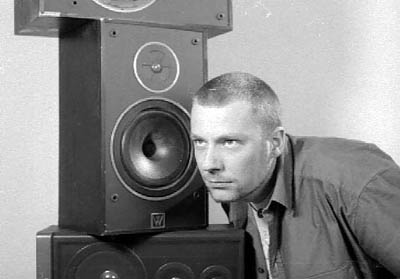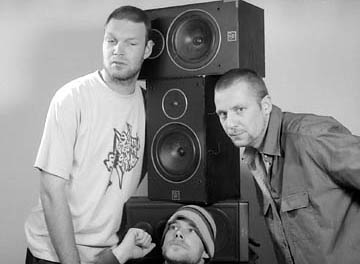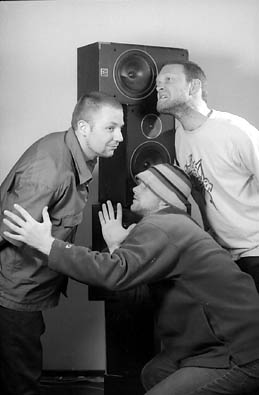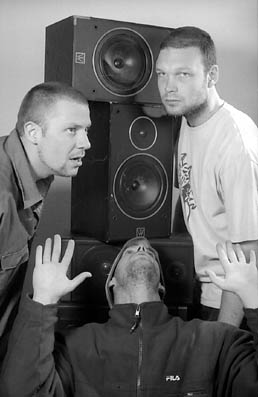'Where to?' is always a question.

Moris: De Kracht Van Vriendelijkheid
14.00 hours, Duivendrecht (-Amsterdam) Trainstation. Time to meet with the Moris gang: Moris, Ketama and Meneer (Mister) Ruys. Wearing my brand new blue rain suit and at the local news stand
bought the latest and last Blaze and Jazz Nu. Got my coffee, chill next to a yellow and blue colored booth.
Open my magazine and try to read. Amazed by the number of people
who step to me with questions about the trains. "No, I don't work here. But just ask, maybe I can help you with
directions for your journey." I take some steps back to see what for kind of booth it is which
I'm standing next to. On this yellow and blue booth there is a
big sign saying: "NS Reizgers Informatie (NS Travel Information)". Aah, that's why. At that time my phone rings, it's Ketama: "Yo, we are at Sloterdijk. Is that right? I think we just went a little bit to far." Well, it's the other side of the city. They had to get out on
the first stop and not the last stop in Amsterdam. When we finally
meet, Ketama excuses himself: "Yes, it was kinda difficult. The ui from Duivendrecht and the
ij from Sloterdijk do sound so alike."

Meneer Ruys, Ketama and Moris
Moris at ART12
"Just bought a house, very busy with painting, fixing and cleaning.
Accidentally I just read in an interview with De La Soul, that one of those guys just bought a house too. So there is
a link", says Moris.
AQ: "Big difference with those bragging and boasting how much gold
they got and how expensive they drink." But you just buy a house
and relax."
Moris: "You can also hire companies to renovate your house. But my girl
and I just bought an old house and do the renovation our self.
It's cool and fun."
AQ: "Tell more about the process on how you did make your album,
De Kracht Van Vriendelijkheid (The Power Of Kindness)".
Moris: "First I met Ketama and started to write rhymes together with
Meneer Ruys. Grew up in Wiege, close to Nijmegen. Later moved to Nijmegen. Once the ball started to roll, we hooked
up. We noticed we liked hanging out together, always very, very
cozy and fun. Became friends, you could say."
AQ: "Very cozy, cozy, haha."
Moris: "Yes. But that is very important, I think. At the local youth
center, chilling, hanging out, playing with the mics and sometimes
with the turntables. Writing rhymes together. I started out with
King Ohmen as Kogelvrij. King stopped. So, I focused more on writing rhymes only for
myself. With my album I wanted to put more depth in it than the
average CD. Have to say it's a little bit of a short album. It
would have been better if it was a bit longer."
AQ: "I do not mind. With its length right now, it's just right…

…Making it longer makes the chance bigger it's getting boring."
Moris: "Yes, maybe it gets monotone. I got a lot of reactions. A lot
of negative feedback of peeps who don't like it. But what I really
like are the many reactions of peeps who are in general not into
HipHop. It's also a CD you don't play in the background, you have
to listen too it."
AQ: "Have to say it's also good background music, while doing your
work the music attracts your ears easily, without the need to
concentrate hard on it, it takes you on a journey. "Hey, what's
happening over here?"."
Moris: "I would say that it's really music you have to listen to. Well,
'must', there is no must. The only must there is, is that you
have to shit once in a while."
Ketama: "The CD was recorded over a period of three quarters of a year.
A lot of records are made in a short time of period, so everything
is made in the same state of mind. Taking more time and doing
other things also, the music grows a lot more, it matured. More
state of minds more different emotions and recorded in different
atmospheres."

About making music:
Ketama: "I just make beats, not with a particular purpose. They write
rhymes on their own. We hear each others work, see who wants what,
or what does match with each others work. Sometimes it results
in a chemical reaction on each others energy. That is how our
music comes together."
AQ: "With your beats, you do challenging things."
Ketama: "Especially in these days too many beat creators use the common
road. Even using the samples that come within the software package.
No more digging in the crates. By doing that your sound becomes
boring, no changes in sound, no own style."
At live performances and on record they interact with cabaret
techniques. Which results in experimental collages of sounds and
thoughts. Where others are still searching for any direction in
their sound collections. Moris succeeds in getting your thoughts
on the move. 'Where to?' is always a question, on which the answer
is less important than the journey itself.
Txt and photo: AQ
Stuurboord-Bakboord Records
Phone: 0031-(0)6-55374837
© 2000 ART12/VanderHoek Publishing. All rights reserved.
|



